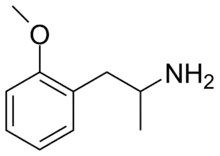2-Methoxyamphetamine
2-Methoxyamphetamine (2-MA), also known as ortho-methoxyamphetamine (OMA), is a drug of the amphetamine class. It is substantially weaker in inhibiting the reuptake of and inducing the release of the monoamine neurotransmitters compared to related agents such as amphetamine, MMA, and PMA,[1] and may instead act as a β-adrenergic receptor agonist similarly to its N-methylated analogue methoxyphenamine.[2]
 | |
| Clinical data | |
|---|---|
| Routes of administration | Oral |
| ATC code |
|
| Identifiers | |
IUPAC name
| |
| CAS Number | |
| PubChem CID | |
| ChemSpider | |
| ChEMBL | |
| CompTox Dashboard (EPA) | |
| Chemical and physical data | |
| Formula | C10H15NO |
| Molar mass | 165.236 g·mol−1 |
| 3D model (JSmol) | |
SMILES
| |
InChI
| |
| | |
See also
- Methoxyphenamine
- 3-Methoxyamphetamine (MMA)
- 4-Methoxyamphetamine (PMA)
References
- Tseng LF, Menon MK, Loh HH (May 1976). "Comparative actions of monomethoxyamphetamines on the release and uptake of biogenic amines in brain tissue". The Journal of Pharmacology and Experimental Therapeutics. 197 (2): 263–71. PMID 1271280.
- Ann Shulgin; Alexander Shulgin (1991). Pihkal: A Chemical Love Story. Transform Press. ISBN 0-9630096-0-5.
This article is issued from Wikipedia. The text is licensed under Creative Commons - Attribution - Sharealike. Additional terms may apply for the media files.